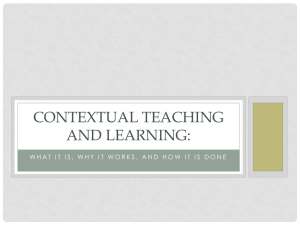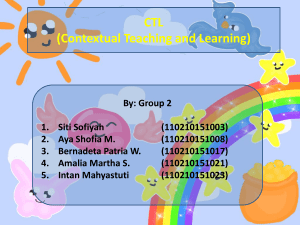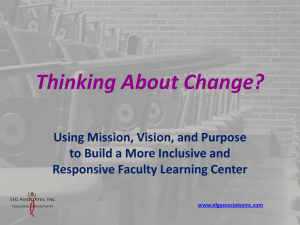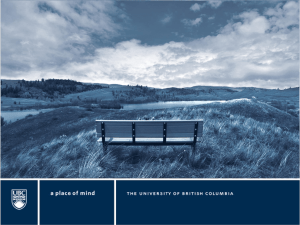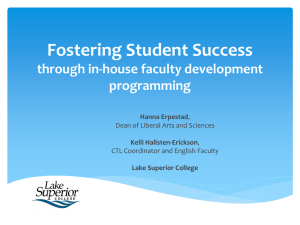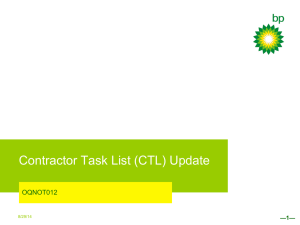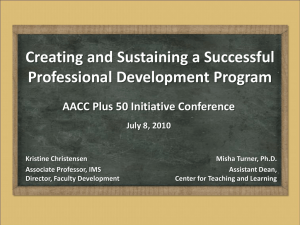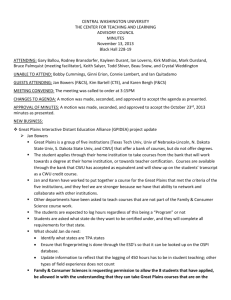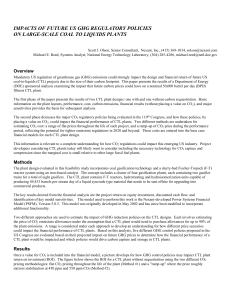Curriculum Studies and Teacher Development
advertisement
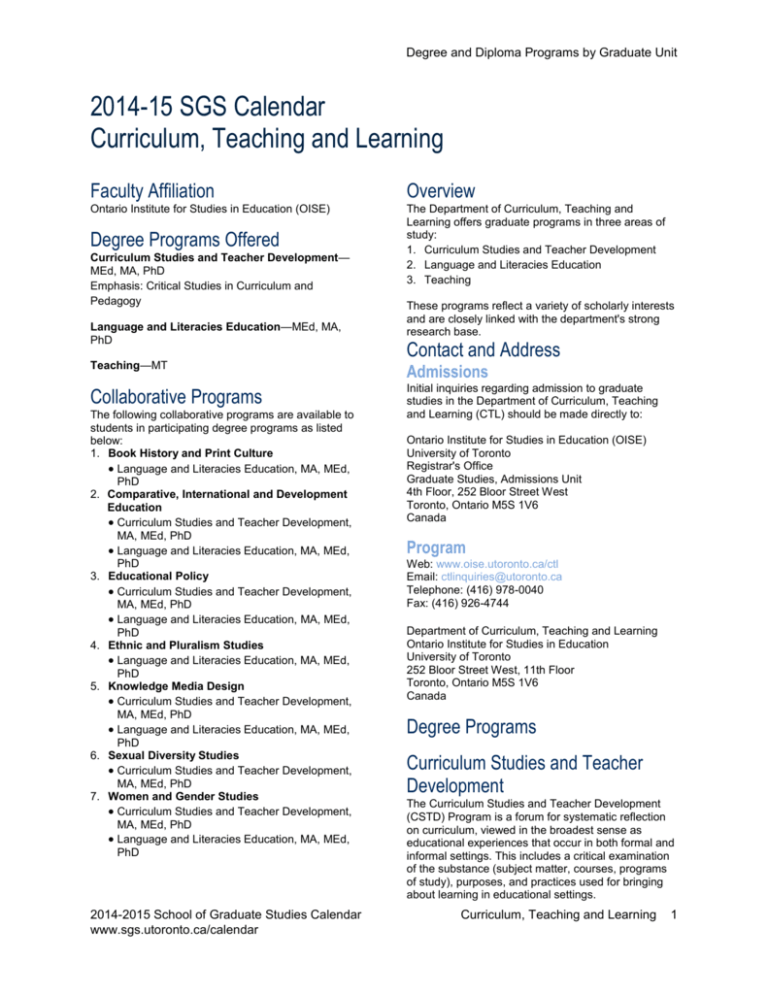
Degree and Diploma Programs by Graduate Unit 2014-15 SGS Calendar Curriculum, Teaching and Learning Faculty Affiliation Overview Ontario Institute for Studies in Education (OISE) The Department of Curriculum, Teaching and Learning offers graduate programs in three areas of study: 1. Curriculum Studies and Teacher Development 2. Language and Literacies Education 3. Teaching Degree Programs Offered Curriculum Studies and Teacher Development— MEd, MA, PhD Emphasis: Critical Studies in Curriculum and Pedagogy Language and Literacies Education—MEd, MA, PhD These programs reflect a variety of scholarly interests and are closely linked with the department's strong research base. Contact and Address Teaching—MT Admissions Collaborative Programs Initial inquiries regarding admission to graduate studies in the Department of Curriculum, Teaching and Learning (CTL) should be made directly to: The following collaborative programs are available to students in participating degree programs as listed below: 1. Book History and Print Culture Language and Literacies Education, MA, MEd, PhD 2. Comparative, International and Development Education Curriculum Studies and Teacher Development, MA, MEd, PhD Language and Literacies Education, MA, MEd, PhD 3. Educational Policy Curriculum Studies and Teacher Development, MA, MEd, PhD Language and Literacies Education, MA, MEd, PhD 4. Ethnic and Pluralism Studies Language and Literacies Education, MA, MEd, PhD 5. Knowledge Media Design Curriculum Studies and Teacher Development, MA, MEd, PhD Language and Literacies Education, MA, MEd, PhD 6. Sexual Diversity Studies Curriculum Studies and Teacher Development, MA, MEd, PhD 7. Women and Gender Studies Curriculum Studies and Teacher Development, MA, MEd, PhD Language and Literacies Education, MA, MEd, PhD 2014-2015 School of Graduate Studies Calendar www.sgs.utoronto.ca/calendar Ontario Institute for Studies in Education (OISE) University of Toronto Registrar's Office Graduate Studies, Admissions Unit 4th Floor, 252 Bloor Street West Toronto, Ontario M5S 1V6 Canada Program Web: www.oise.utoronto.ca/ctl Email: ctlinquiries@utoronto.ca Telephone: (416) 978-0040 Fax: (416) 926-4744 Department of Curriculum, Teaching and Learning Ontario Institute for Studies in Education University of Toronto 252 Bloor Street West, 11th Floor Toronto, Ontario M5S 1V6 Canada Degree Programs Curriculum Studies and Teacher Development The Curriculum Studies and Teacher Development (CSTD) Program is a forum for systematic reflection on curriculum, viewed in the broadest sense as educational experiences that occur in both formal and informal settings. This includes a critical examination of the substance (subject matter, courses, programs of study), purposes, and practices used for bringing about learning in educational settings. Curriculum, Teaching and Learning 1 Degree and Diploma Programs by Graduate Unit Ordinarily, applicants will have at least one year of The CSTD program includes three areas of interest, which reflect overlapping and intersecting areas of strength in the whole Curriculum Studies and Teacher Development Program. One of these areas of interest can be taken as part of an emphasis in Critical Studies in Curriculum and Pedagogy. More details on the clusters. Critical Studies in Curriculum and Pedagogy Taking curriculum and pedagogy broadly defined as points of departure, the Critical Studies in Curriculum and Pedagogy cluster is a forum for systematic and interdisciplinary reflection on the myriad of processes and contexts related to educational experience, from schools and local communities, to media and transnational cultural contexts. The cluster encourages a critical exploration of educational phenomena, within and beyond the scope of schools, with a focus on power relations and social justice issues. Learning, Schools, and Innovations The Learning, Schools, and Innovations cluster emphasizes scholarship concerning the nature of learning and instruction in formal and informal settings, building on a broad academic literature in educational research, the learning sciences, evaluation and assessment, and learning and instruction within subject areas. The focus is to achieve a theoretical understanding of learning and instruction, embedding that theory in powerful innovations, and advancing the research. Teaching and Teacher Education This cluster focuses on the study of teaching and teacher learning across the curriculum. The term "teacher" is used broadly to include those who work in schools, district and government offices, and diverse settings (e.g., museum studies, outdoor education centres). Master of Education The MEd degree program is designed chiefly for the professional development of those who are already engaged in a career related to education. Minimum Admission Requirements Applicants are admitted under the General Regulations of the School of Graduate Studies, which specify an appropriate bachelor's degree from a recognized university. This degree must be completed with an academic standing equivalent to a University of Toronto mid-B or better in the final year. Applicants must also satisfy the Department of Curriculum, Teaching and Learning's additional admission requirements stated below. 2014-2015 School of Graduate Studies Calendar www.sgs.utoronto.ca/calendar relevant, successful, professional experience prior to applying. In the Statement of Intent, applicants should state the reasons they wish to study curriculum at the graduate level. The chief academic interests, professional concerns, and career plans related to curriculum studies and teacher development should be discussed. In order to identify their research interests in their Statement of Intent, applicants should visit the Curriculum Studies and Teacher Development web page. The Admissions Committee reviews this statement to determine the kind of focus or area of study in which an applicant is most interested and to link the applicant to appropriate faculty advisors. Program Requirements 5.0 full-course equivalents (FCEs), of which at least 2.5 FCEs are normally CTL 1000-level courses undertaken in the Curriculum Studies and Teacher Development program. Students are required to successfully complete CTL 1000H. Additional study may be required either within the degree program or prior to admission, depending on previous experience and academic qualifications. The MEd may be taken on a full-time or part-time basis. Program Length 4 sessions full-time (typical registration sequence: F/W/S/F); 10 sessions part-time Time Limit 3 years full-time; 6 years part-time Master of Arts The MA degree program is designed to provide academic study and research training related to curriculum studies. Applicants who anticipate going on to further study at the PhD level are advised to apply for enrolment in an MA rather than an MEd degree program. Minimum Admission Requirements Applicants are admitted under the General Regulations of the School of Graduate Studies. Applicants must also satisfy the Department of Curriculum, Teaching and Learning's additional admission requirements stated below. Admission normally requires an appropriate bachelor's degree, with the equivalent of at least a University of Toronto mid-B or better in the final year, in a relevant discipline or professional program. Curriculum, Teaching and Learning 2 Degree and Diploma Programs by Graduate Unit Ordinarily, applicants will have at least one year of Full-Time PhD relevant, successful, professional experience prior to applying. Statement of Intent. Applicants should state the reasons they wish to undertake a research-oriented program of study in curriculum or teacher development. The chief academic interests and experience, professional concerns, and career plans related to an aspect of curriculum studies should be discussed. In order to identify their research interests in their Statement of Intent, applicants should visit the Curriculum Studies and Teacher Development program web page. The Admissions Committee reviews this statement to determine the kind of curriculum problem or area of study in which an applicant is most interested and to link the applicant to appropriate faculty advisors. A master's degree in education from a recognized Program Requirements 4.0 full-course equivalents (FCEs), of which at least 2.0 FCEs are normally CTL 1000-level courses undertaken in the Curriculum Studies and Teacher Development program. Additional courses may be required of some applicants, depending on previous experience and academic qualifications. Students are required to successfully complete CTL 1000H, and a course in research methods from an approved course listing. See listing of approved research methods courses. Thesis. Students are responsible for meeting deadlines to complete their course requirements, thesis committee formation, and ethical review. The MA may be taken on a full-time or part-time basis. Program Length 6 sessions full-time (typical registration sequence: F/W/S/F/W/S); 10 sessions part-time Time Limit 3 years full-time; 6 years part-time Doctor of Philosophy The PhD program demands a strong commitment to research. The Curriculum Studies and Teacher Development program offers both full-time and flexible-time PhD program options. Applicants must declare the option for which they wish to apply. Minimum Admission Requirements Applicants are admitted under the General Regulations of the School of Graduate Studies. Applicants must also satisfy the Department of Curriculum, Teaching and Learning's additional admission requirements stated below. 2014-2015 School of Graduate Studies Calendar www.sgs.utoronto.ca/calendar university with a grade equivalent to a University of Toronto B+ or better and in the same area of specialization as proposed at the doctoral level is required. Further documentation may be required to establish equivalence. Applicants ordinarily have a minimum of two years' professional experience prior to applying. Applicants are required to submit, along with the application: o their master's thesis or a sample of singleauthored scholarly writing; for details about what constitutes an appropriate writing sample, visit the Curriculum Studies and Teacher Development web page. o a Statement of Intent describing their intellectual interests and concerns relevant to curriculum studies and teacher development, reasons for wishing to take the program, previous qualifications and professional experiences, particular research or professional interests, and future career goals o two letters of reference, one academic and one professional Flexible-Time PhD Applicants to the flexible-time PhD option are accepted under the same admission requirements as applicants to the full-time PhD option. However, in addition, applicants to the flexible-time PhD should demonstrate that they are active professionals engaged in activities relevant to their proposed program of study. Program Requirements Degree requirements for the full-time and flexibletime options of the PhD are the same. Only the length of time to completion differs. (See Time Limit, below.) The PhD program normally consists of 3.5 fullcourse equivalents (FCEs), of which at least 2.0 FCEs are ordinarily CTL 1000-level courses. Students are also required to complete CTL 1899H, the CSTD Doctoral Proseminar course. Additional courses may be required of some students. Students are expected to take CTL 1000H if they did not complete it at the master's level, one course in research methods from an approved course listing, as well as the CSTD Doctoral Proseminar. The listing for approved research methods courses is available on the CSTD web page. Successful completion of a comprehensive examination. Curriculum, Teaching and Learning 3 Degree and Diploma Programs by Graduate Unit A thesis, embodying the results of an original CTL 1011H Anti-Oppression Education in School Settings CTL 1011H L’éducation pour l’anti-oppression en milieu scolaire CTL 1012H Curriculum for Girls and Young Women: Historical and Contemporary Issues CTL 1014H Evaluation of Curriculum and Instruction Emphasis: Critical Studies in Curriculum and Pedagogy CTL 1016H Cooperative Learning Research and Practice The emphasis in Critical Studies in Curriculum and Pedagogy will encourage a critical exploration of educational phenomena, within and beyond the scope of schools, and will focus on social justice issues in education including issues related to environmental justice, globalization, colonialism, race, disability, gender, sexuality, and cultural and linguistic difference. MEd, MA, and PhD students must successfully complete: 1.5 full-course equivalents (FCEs) (three core courses), which are counted towards the total FCEs required for the student's degree program; Three courses selected from the following: CTL 3031H, CTL 1011H, CTL 1024H, CTL 1031H, CTL 1037H, CTL 1048H, CTL 1062H, CTL, 1063H, CTL 1064H, CTL 1065H, CTL 1099H, CTL 1218H, CTL 1219H, CTL 1220H, CTL 1221H, CTL 1302H, CTL 1304H. CTL 1306H, CTL 1307H, CTL 1309H, CTL 1312H, CTL 1313H, CTL 1318H, CTL 1319H, CTL 1816H, CTL 1818H, CTL 1822H, CTL 1861H, CTL 3034H. Upon successful completion of the emphasis requirements and the successful completion of the degree requirements, the student will receive a Letter of Completion. CTL 1018H Introduction to Qualitative Inquiry in Curriculum, Teaching, and Learning CTL 1019H Authentic Assessment CTL 1020H Teaching High Ability Students CTL 1023H Technology and Education: Critical Perspectives on Theory and Practice CTL 1024H Poststructuralism and Education CTL 1026H Improving Teaching CTL 1027H Facilitating Reflective Professional Development CTL 1028H Constructive Feedback in Teaching CTL 1029H From Student to Teacher: Professional Induction CTL 1031H Language, Culture, and Identity: Using the Literary Text in Teacher Development Course List CTL 1032H Knowing and Teaching Not all courses are offered every year. Please consult the department for course offerings. CTL 1033H Multicultural Perspectives in Teacher Development: Reflective Practicum CTL 1036H Thoughtful Teaching and Practitioner Inquiry CTL 1037H Teacher Development: Comparative and Cross-Cultural Perspectives investigation, and a Doctoral Final Oral Examination on the content and implications of the thesis. Students are responsible for meeting deadlines to complete their course requirements, thesis committee formation, comprehensive examination, and ethical review. Program Length 4 years full-time; 8 years flexible-time Time Limit 6 years full-time; 8 years flexible-time Master's Level CTL 1000H Fondements du l'étude des programmes scolaires CTL 1000H Foundations of Curriculum Studies CTL 1001H Values and Schooling CTL 1005H Language, Literacy, and the School Curriculum CTL 1038H Change and Curriculum Implementation CTL 1007H Communities of Learning: Teachers Constructing Professional Knowledge CTL 1040H Fundamentals of Program Planning and Evaluation 2014-2015 School of Graduate Studies Calendar www.sgs.utoronto.ca/calendar Curriculum, Teaching and Learning 4 Degree and Diploma Programs by Graduate Unit CTL 1041H Research Methods In Education CTL 1206H Teaching and Learning Science CTL 1042H Instrument Development in Education CTL 1207H CTL 1043H Research Issues in Alternative Assessments Teaching and Learning about Science: Issues and Strategies in Science, Technology, Society, and Environment (STSE) Education CTL 1208H CTL 1045H Survey Research Curriculum Issues in Science and Technology: An Historical Perspective CTL 1046H Training Evaluation CTL 1209H CTL 1047H Course-Self-Assessment Current Issues in Science and Technology Education CTL 1048H Qualitative Methodology: Challenges and Innovations CTL 1211H Action Research in Science, Mathematics, and Technology Education CTL 1060H Education and Social Development CTL 1212H CTL 1062H Performed Ethnography and Research Informed Theatre Curriculum Making in Science: Some Considerations in the History, Philosophy and Sociology of Science CTL 1063H Pedagogies of Solidarity CTL 1214H Equity Issues in Science Education CTL 1064H Applied Theatre and Performance in Sites of Learning CTL 1215H Teaching and Learning About Science and Technology: Beyond Schools CTL 1216H Teacher Leadership in Curriculum, Teaching and Technology Education CTL 1065H Approaches to Anti-Homophobia and Anti-Transphobia Education CTL 1099H Critical Approaches to Arts-Based Research CTL 1104H Play, Drama, and Arts Education CTL 1217H Integrating Science, Mathematics and Technology Curricula CTL 1105H Research and Inquiry in Arts Education CTL 1218H Culture and Cognition in Mathematics, Science and Technology Education CTL 1106H Spirituality in Education CTL 1110H The Holistic Curriculum CTL 1219H Making Secondary Mathematics Meaningful CTL 1115H Teacher Education and the Construction of Professional Knowledge: Holistic Perspectives CTL 1220H Sociocultural Theories of Learning CTL 1221H Experiencing Science Education as a Global Educational and Development Endeavour CTL 1222H Environmental Studies in Science, Mathematics and Technology Education CTL 1304H Cultural Studies and Education CTL 1306H La recherche qualitative en éducation: bases théoriques et pratiques CTL 1306H Qualitative Research Methods in Education: Concepts and Methods CTL 1116H Holistic Education Approaches in Elementary School Mathematics CTL 1117H Liberatory Practices in Drama and Education CTL 1119H Gaining Confidence in Mathematics: A Holistic Approach to Rebuilding Math Knowledge and Overcoming Anxiety CTL 1200H Science in the School Curriculum CTL 1202H Mathematics in the School Curriculum: Elementary 2014-2015 School of Graduate Studies Calendar www.sgs.utoronto.ca/calendar Curriculum, Teaching and Learning 5 Degree and Diploma Programs by Graduate Unit CTL 1307H Identité collective et éducation minoritaire de langue française CTL 1429H Ethnicity and the Development of Canadian Education CTL 1307H Identity Construction and Education of Minorities CTL 1430H Gendered Colonialisms, Imperialisms and Nationalisms in History CTL 1309H Les stéréotypes sexuels dans les programmes scolaires CTL 1448H Popular Culture and the Social History of Education II CTL 1454H The Battle Over History Education in Canada CTL 1460H History and Educational Research CTL 1602H Introduction to Computers in Education CTL 1603H Introduction to Knowledge Building CTL 1604H Video/Multimedia Design CTL 1606H Computers in the Curriculum CTL 1608H Constructive Learning and Design of Online Environment CTL 1609H Educational Applications of Computer-Mediated Communication CTL 1611H Computer-Mediated Distance Education CTL 1612H The Virtual Library (Non-Credit) CTL 1614H Knowledge Media and Learning CTL 1797H Practicum in Curriculum: Master's Level Rural Education and Social Reform in Canadian History, 1860–1960 CTL 1798H Individual Reading and Research in Curriculum: Master's Level History of Education and Society: Selected Topics CTL 1799H Special Topics in Curriculum: Master's Level CTL 1312H Democratic Citizenship Education CTL 1313H Gender Equity in the Classroom CTL 1316H Global Education: Theory and Practice CTL 1318H Teaching Conflict and Conflict Resolution CTL 1319H Religious Education: Comparative and International Perspectives CTL 1400H Classroom Adaptations and Instructional Strategies CTL 1402H Adaptive Instruction in Inclusive Classrooms CTL 1403H Special Education and Social Representation of Difference CTL 1405H The Origins of Modern Schooling I: Problems in Education Before the Industrial Revolution CTL 1406H The Origins of Modern Schooling: Issues in the Development of the North American Educational System CTL 1407H CTL 1408H CTL 1423H Families, Schooling and Canadian History, 1840–1970 CTL 1424H Religion, Ideology, and Social Movement in the Development of North American Education CTL 1426H CTL 1427H CTL 1428H Doctoral Level CTL 1801H Action Research and Professional Practice CTL 1808H The History of Gender and Education in Canada Curriculum Innovation in Teacher Education CTL 1809H Commemorating Canada, 1800s– 1900s Narrative and Story in Research and Professional Practice CTL 1810H Qualitative Research in Curriculum and Teaching Immigration and the Development of Canadian Education 2014-2015 School of Graduate Studies Calendar www.sgs.utoronto.ca/calendar Curriculum, Teaching and Learning 6 Degree and Diploma Programs by Graduate Unit CTL 1811H Writing Research/Research Writing: Moving from Idea to Reality CTL 1999H Special Topics in Curriculum: Doctoral Level CTL 1812H Professional Ethics of Teaching and Schooling CTL 3410H Schooling in the Movies: Education as Reflected in Hollywood Films CTL 1816H Minority Education and Inclusion: Policies in Practice CTL 1817H Current Issues in Teacher Education CTL 1818H Arts in Education: Concepts, Contexts and Frameworks CTL 1819H Multicultural Literature in the Schools: Critical Perspectives and Practices CTL 1822H Urban School Research: Youth, Pedagogy, and the Arts CTL 1825H The Teacher as a Contemplative Practitioner CTL 1841H Research Seminar in Science, Mathematics and Technology Education CTL 1842H Mixed Methods Research in Education: Combining Qualitative and Quantitative Inquiries CTL 1844H Seminar in Evaluation Problems (prerequisite: CTL 2803H, CTL 1843H, or equivalent) CTL 1846H Assessment for Teaching and Learning CTL 1847H Data Analysis and Integration in Mixed Methods Research CTL 1861H Critical Ethnography CTL 1864H Methodologies for Comparing Educational Systems CTL 1899H CSTD Doctoral Proseminar CTL 1923H Mobile and Ubiquitous Computing in Education CTL 1926H Knowledge Media and Learning CTL 1997H Practicum in Curriculum: Doctoral Level CTL 1998H,Y Individual Reading and Research in Curriculum: Doctoral Level 2014-2015 School of Graduate Studies Calendar www.sgs.utoronto.ca/calendar Language and Literacies Education The Language and Literacies Education program investigates questions around the relationships of literacies in language and language in literacies across communities, societies, instructional environments, and informal learning settings. The scope of the program encompasses the following within applied linguistics and literacies studies: a. the learning, teaching, and use of first and additional (non-native) languages in diverse settings; b. curriculum, instruction, and assessment related to the development of first and additional language and K-12 literacy skills; c. the development of bilingual, multilingual, and translinguistic abilities; d. language and literacy education policies and planning; e. pedagogy oriented towards multiliteracies development, including early literacy and adolescent reading, writing, and oral language development, and children's literature across the curriculum; f. social justice issues related to plurilingualism and cultural and linguistic diversity; and g. pedagogical implications of the fact that language and literacy are infused into all aspects of learning in contexts characterized by linguistic diversity. Specific resources related to the program include the OISE library's Modern Language Collection, la Collection Franco-Ontarienne, the Children's and Young Adult literature collection, and the Centre for Educational Research on Languages and Literacies. The program offers three degrees: MEd, MA, and PhD. Master of Education Minimum Admission Requirements Applicants are admitted under the General Regulations of the School of Graduate Studies, which specify an appropriate bachelor's degree from a recognized university, with the equivalent of a University of Toronto mid-B or better in the final year. Applicants must also satisfy the Department of Curriculum, Teaching and Learning's additional admission requirements stated below. Ordinarily, applicants should have teacher certification and at least one year of relevant successful professional experience prior to applying. Curriculum, Teaching and Learning 7 Degree and Diploma Programs by Graduate Unit All applicants are required to submit a resumé and a Statement of Intent describing their reasons for wishing to take the program, previous qualifications and professional experiences, particular research or professional interests, and future goals. Program Requirements The MEd program consists of 5.0 full-course equivalents (FCEs). A minimum of 2.5 FCEs CTL 3000-level courses must be taken. The MEd program of study may be taken on a fullor part-time basis. Program Length 4 sessions full-time (typical registration sequence: F/W/S/F); 10 sessions part-time Time Limit 3 years full-time; 6 years part-time Master of Arts Minimum Admission Requirements Applicants are admitted under the General Regulations of the School of Graduate Studies. Admission requires an appropriate bachelor's degree, with the equivalent of a University of Toronto mid-B or better in the final year, in a relevant discipline or professional program. Applicants must also satisfy the Department of Curriculum, Teaching and Learning's additional admission requirements stated below. Ordinarily, applicants should have teacher certification and at least one year of relevant successful professional experience prior to applying. Applicants expecting to pursue a doctorate in the future are advised to enrol in the MA (rather than MEd) program. All applicants are required to submit a resumé and a Statement of Intent describing their reasons for wishing to take the program, previous qualifications and professional experiences, particular research or professional interests, and future career goals. Program Requirements The MA program may be undertaken on a full-time or part-time basis. The program requires 4.0 full-course equivalents (FCEs) or 8.0 half courses plus a thesis. Students must take a minimum of 2.0 FCEs CTL 3000-level courses within the LLE program. Courses must include CTL 3001H Research Colloquium in Language and Literacies Education. Part-time students are expected to be available to take CTL 3001H during daytime hours (usually Friday afternoons). 2014-2015 School of Graduate Studies Calendar www.sgs.utoronto.ca/calendar Students must also take a course in research methods relevant to the topic of the thesis. Any of the following courses can fulfil this requirement: CTL 1018H, CTL 1041H, CTL 1306H, CTL 1810H, CTL 1842H, CTL 3019H, CTL 3800H, CTL 3803H, CTL 3807H, APD 1287H, APD 1288H, or HSJ 1905H. Students wishing to propose an alternative course to fulfil one of the LLE course requirements will be required to obtain the approval of both the LLE graduate program coordinator and either their faculty advisor or their thesis supervisor. Additional courses may be required of some applicants. Students are responsible for meeting deadlines to complete their course requirements, thesis committee formation, and ethical review. Program Length 6 sessions full-time (typical registration sequence: F/W/S/F/W/S); 10 sessions part-time Time Limit 3 years full-time; 6 years part-time Doctor of Philosophy Individuals participating in the PhD program must have a strong commitment to research. The LLE program offers both full-time and flexible-time PhD options. Applicants must declare their preferred option when applying. Minimum Admission Requirements Applicants are admitted under the General Regulations of the School of Graduate Studies. Applicants must also satisfy the Department of Curriculum, Teaching and Learning's additional admission requirements stated below. Full-Time PhD An appropriate master's degree with a grade equivalent to a University of Toronto B+ or better from a recognized university is required. Admission is contingent upon satisfactory completion of a master's thesis, or the equivalent in the form of a scholarly piece of writing. Ordinarily, applicants will have a minimum of two years of relevant professional experience prior to applying. All applicants are required to submit a resumé and a Statement of Intent describing their reasons for wishing to take the program, previous qualifications and professional experiences, particular research or professional interests, and future career goals. Flexible-Time PhD Applicants to the flexible-time PhD option are accepted under the same admission requirements Curriculum, Teaching and Learning 8 Degree and Diploma Programs by Graduate Unit as applicants to the full-time PhD option. However, in addition, applicants to the flexible-time PhD should demonstrate that they are active professionals engaged in activities relevant to their proposed program of study. CTL 3000H Foundations of Bilingual and Multicultural Education CTL 3001H Research Colloquium in Language and Literacies Education CTL 3002H Second Language Teaching Methodologies CTL 3002Y Methodology and Organization of Second-Language Teaching CTL 3003H Planning and Organizing the Second Language Curriculum CTL 3004H Language Awareness and its Role in Teacher Development CTL 3005H Current Issues in English as a Second Language CTL 3007H Discourse Analysis CTL 3007H Séminaire sur le langage et la communication CTL 3008H Critical Pedagogy, Language, and Cultural Diversity CTL 3010H Second-Language Learning CTL 3011H Cognitive, Sociolinguistic and Sociopolitical Orientations in Bilingual Education Research CTL 3011H Bilinguisme et éducation ou membre de la faculté à déterminer CTL 3013H Language Assessment CTL 3015H Language and Literacies Education in Multilingual Contexts CTL 3018H Language Planning and Policy CTL 3018H Politique et amnagement linguistique CTL 3019H Research Themes in Canadian French as a Second Language Education Time Limit CTL 3020H Writing in a Second Language 6 years full-time; 8 years flexible-time CTL 3021H Pedagogical Grammar of French Not all courses are offered every year. Please consult the department for course offerings. CTL 3023H Sociolinguistique du français canadien CTL 3024H Language Teacher Education CTL 3025H Educational Sociolinguistics Program Requirements Degree requirements for the full-time and the flexible-time PhD programs are the same. The PhD requires 3.0 to 4.0 full-course equivalents (FCEs) depending on previous experience and academic qualifications. Students must take a minimum of 2.0 FCEs of CTL 3000-level courses within the LLE program, including CTL 3001H Research Colloquium in Language and Literacies Education. If CTL 3001H was taken at the master's level, students are not permitted to take it again and should substitute it with another CTL 3000-level course. A research methods course relevant to the topic of the thesis is also a requirement of the PhD program unless students have previously taken it at the master's level. Any of the following courses can fulfil this requirement: CTL 1018H, CTL 1041H, CTL 1306H, CTL 1810H, CTL 1842H, CTL 3019H, CTL 3800H, CTL 3803H, CTL 3807H, APD 1287H, APD 1288H, HSJ 1905H. Comprehensive examination. A thesis embodying the results of an original investigation, and a Doctoral Final Oral Examination on the content and implications of the thesis. A student wishing to propose an alternative course to fulfil one of the LLE course requirements will be required to obtain the approval of the LLE Program Coordinator and either her or his faculty advisor or thesis supervisor. Full-Time PhD: A minimum of two consecutive years of full-time study are required at the beginning of the program, during which time students usually complete course requirements, pass the comprehensive examination, prepare a thesis proposal, and form a thesis committee. Flexible-Time PhD: Students may apply for parttime status after four years of full-time registration. Program Length 4 years full-time; 7 years flexible-time Course List Master's Level APD 1296H Assessing School-Aged Language Learners 2014-2015 School of Graduate Studies Calendar www.sgs.utoronto.ca/calendar Curriculum, Teaching and Learning 9 Degree and Diploma Programs by Graduate Unit CTL 3026H Pragmatics in Language Education CTL 3808H The Role of Instruction in Second Language Learning CTL 3027H Planification de la programmation pour un enseignement efficace CTL 3809H Research Seminar in Sociocultural Theory and Second Language Learning CTL 3997H Practicum Second Language: Doctoral Level CTL 3998H Individual Reading and Research in Language and Literacies Education: Doctoral Level CTL 3999H Special Topics in Language and Literacies Education: Doctoral Level CTL 3027H Curriculum Development for Effective Teaching CTL 3028H Language Arts in Elementary Education CTL 3029H Children's Literature as a Foundation of Literate Behaviour Across the Curriculum CTL 3030H Theory and Practice in Elementary Literacy Instruction CTL 3031H Children's Literature Within a Multicultural Context CTL 3032H Teaching Writing in the Classroom CTL 3033H Literary Research Methodologies CTL 3034H New Literacies: Making Multiple Meanings CTL 3035H Critical Literacy in Action CTL 3036H Expressive Writing: Practice and Pedagogy CTL 3797H Practicum in Language and Literacies Education: Master's Level CTL 3798H Individual Reading and Research in Language and Literacies Education: Master's Level Teaching Master of Teaching The Teaching program offers students a unique educational opportunity that combines teacher qualification with advanced study of educational theory and an opportunity to conduct research. The program provides students with a strong grounding in curriculum, human development, ethics, educational law, diversity, educational technology, teaching, and learning. This teacher education program offers the opportunity for elementary and secondary student teachers to deepen their knowledge of all aspects of teaching. The high level of academic rigour, combined with increased practice teaching experiences enhances and extends the theoretical and practical knowledge of students preparing to become teachers. The program includes: formal coursework, teaching and research seminars, practice teaching, internship, and a major research project. Minimum Admission Requirements Applicants are admitted under the General CTL 3799H Special Topics in Language and Literacies Education: Master's Level JHC 1251H Reading in a Second Language JTE 1952H Language Culture and Education/M. Heller Doctoral Level CTL 3800H Second Language Classroom Research CTL 3803H Ethnographic Research in the Language Disciplines CTL 3805H Multilingualism and Plurilingualism CTL 3806H Sociocultural Theory and Second Language Learning CTL 3807H Processing Second Language Data 2014-2015 School of Graduate Studies Calendar www.sgs.utoronto.ca/calendar Regulations of the School of Graduate Studies. Applicants must also satisfy the Department of Curriculum, Teaching and Learning's additional admission requirements stated below. Applicants must have an appropriate bachelor's degree with the equivalent of a University of Toronto mid-B or better in the final year. In their Statement of Intent, applicants should describe three significant teaching and/or teachingrelated experiences that they have had, especially with groups of children. With reference to these experiences, applicants should identify insights gained about teaching and learning, and explain how, based on these insights, they might contribute to the education of students in today's schools. Included in their resumé, applicants are requested to list, in chart form, the extent of their teaching experiences. The chart should include Curriculum, Teaching and Learning 10 Degree and Diploma Programs by Graduate Unit dates, location of experience, role, and number of hours working with students. Given program limitations, not all eligible applicants are guaranteed admission. A police record check is required in a practicum setting in both Year 1 and 2 of the program. Program Requirements The two-year MT degree requires 9.0 full-course equivalents (FCEs). Students must successfully complete a major research paper at the end of the program in order to graduate and receive the MT degree and a recommendation to the Ontario College of Teachers for an Ontario Teachers' Certificate of Qualification. The major research paper will appear on MT students' transcripts as the course CTL 7099Y0 Master of Teaching Research Project. Normally, advanced standing is not granted in this program. The two-year program is undertaken on a full-time basis. Registration in Year 2 is contingent upon successful completion of all first-year work. CTL 7007H Authentic Assessment CTL 7008H Introduction to Special Education and Adaptive Instruction CTL 7009H Anti-Discriminatory Education CTL 7010H Issues in Numeracy and Literacy CTL 7013H Arts in Education CTL 7015H From Student to Professional CTL 7016H Integrating Technology Into the Classroom: Issues and Activities Junior/Intermediate Concentration First-Year Core Courses CTL 7000H Curriculum and Teaching in Literacy CTL 7001H Educational Professionalism, Ethics and the Law CTL 7002H Curriculum and Teaching in Mathematics 5 sessions full-time (typical registration sequence: F/W/S/F/W); CTL 7003H Curriculum and Teaching in Social Studies and Science 3 years full-time CTL 7004H Practice Teaching (Year 1) Core Courses CTL 7006H Reflective Teaching and Inquiry into Research in Education CTL 7011H Child and Adolescent Development Fundamentals of Teaching Program Length Time Limit Primary/Junior Concentration First-Year Core Courses CTL 7000H Curriculum and Teaching in Literacy CTL 7014H CTL 7001H Educational Professionalism, Ethics and Law CTL 7099Y0 Master of Teaching Research Project (Credit/No Credit) CTL 7002H Curriculum and Teaching in Mathematics CTL 7003H Curriculum and Teaching in Social Studies and Science CTL 7004H Practice Teaching (Year 1) CTL 7006H Reflective Teaching and Inquiry into Research in Education CTL 7011H Child and Adolescent Development CTL 7014H Fundamentals of Teaching CTL 7099Y0 Master of Teaching Research Project (Credit/No Credit) Second-Year Core Courses CTL 7005H Second-Year Core Courses CTL 7005H Practice Teaching (Year 2) CTL 7007H Authentic Assessment CTL 7008H Introduction to Special Education and Adaptive Instruction CTL 7009H Anti-Discriminatory Education CTL 7010H Issues in Numeracy and Literacy CTL 7013H Arts in Education CTL 7015H From Student to Professional CTL 7016H Integrating Technology Into the Classroom Practice Teaching (Year 2) 2014-2015 School of Graduate Studies Calendar www.sgs.utoronto.ca/calendar Curriculum, Teaching and Learning 11 Degree and Diploma Programs by Graduate Unit Intermediate/Senior Concentration First-Year Core Courses CTL 7001H of four of them in the area of biology, are required regardless of whether it is the first or second teaching subject. Educational Professionalism, Ethics and the Law Program Length CTL 7004H Practice Teaching (Year 1) 5 sessions full-time (typical registration sequence: F/W/S/F/W) CTL 7006H Reflective Teaching and Inquiry into Research in Education CTL 7007H Authentic Assessment CTL 7011H Child and Adolescent Development CTL 7014H Fundamentals of Teaching CTL 7099Y0 Master of Teaching Research Project (Credit/No Credit) Time Limit 3 years full-time Second-Year Core Courses CTL 7005H Practice Teaching (Year 2) CTL 7008H Introduction to Special Education and Adaptive Instruction CTL 7009H Anti-Discriminatory Education CTL 7012H Issues in Secondary Education CTL 7015H From Student to Professional CTL 7016H Integrating Technology Into the Classroom CTL 7099Y0 Master of Teaching Research Project (Credit/No Credit) 0 Course that may continue over a program. The course is graded when completed. The Intermediate/Senior concentration students must select one teaching subject from the following list as their first teaching subject and one as their second teaching subject: CTL 7020Y Curriculum and Teaching in English— Intermediate/Senior CTL 7021Y Curriculum and Teaching in History— Intermediate/Senior CTL 7022Y Curriculum and Teaching in Mathematics—Secondary CTL 7023Y Curriculum and Teaching in Science: Biology—Intermediate/Senior Prerequisites: Five full university courses in the first teaching subject and two full courses in the second teaching subject. In the case of CTL 7023Y Curriculum and Teaching in Science: Biology, five full university courses in science, with a minimum 2014-2015 School of Graduate Studies Calendar www.sgs.utoronto.ca/calendar Curriculum, Teaching and Learning 12
